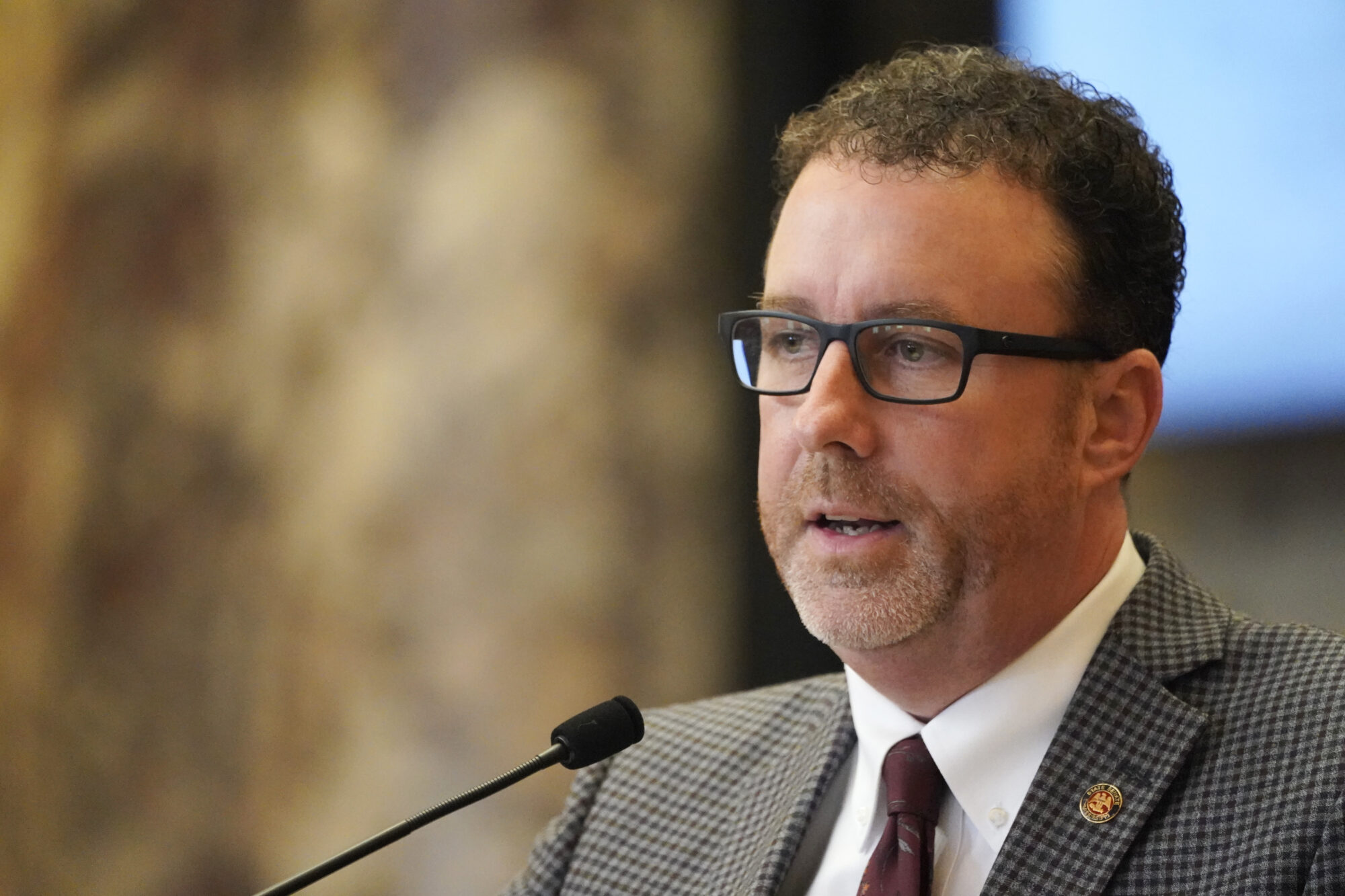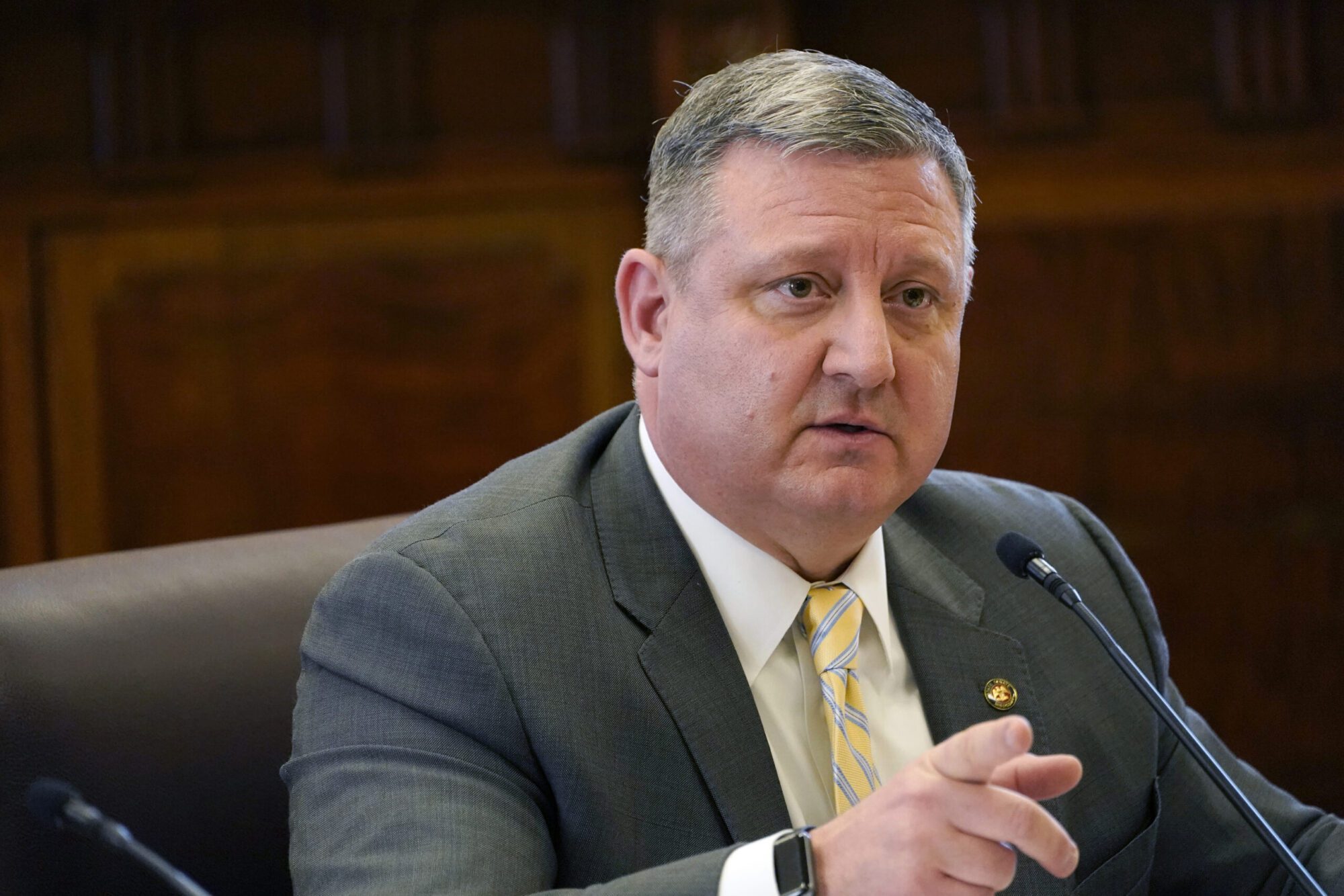
FILE - Mississippi state Sen. David Parker, R-Olive Branch, speaks during a debate at the state Capitol on Feb. 7, 2023, in Jackson, Miss. On Thursday, Jan. 11, 2024, Republican Lt. Gov. Delbert Hosemann named Parker as the new chairman of the Senate Accountability, Efficiency and Transparency Committee, which will give Parker influence over creating a new initiative process for Mississippi. (AP Photo/Rogelio V. Solis, File)
- The new language would not alter the make up of the PERS Board but would prevent the expected employer contribution increase from taking effect and require future rate changes to be approved by the Legislature.
The Mississippi Senate took aim at addressing the looming employer rate increase approved by the Public Employers Retirement System (PERS) Board. The increase would phase in a five percent increase over the next three years, starting with a two percent jump this July.
The new vehicle for the language is HB 1618, originally filed to only address a program that allows certain retirees, namely healthcare workers and teachers, to return to the workforce in an effort to impact critical shortages.
A substitute to the original strike-all was offered by State Senator David Parker (R) on the Senate floor. The language would leave the PERS Board as it is structured currently and rescind the employer rate increase set to take effect in July. It also lays out that any future rate increase recommendations made by the PERS Board must be accompanied by two additional independent actuarial assessments and then approved by the Legislature.
The amendment also continues to protect benefits already guaranteed to current employees and retirees.
The Senate passed the bill by a vote of 38 to 7 on Tuesday.
HB 1618 will now head back to the House where members can either concur or invite conference.
“I believe every single city would have to implement a tax increase to make [the employer contribution increase] happen. My goal is to provide more of a teamwork type of attitude going forward,” said Parker when explaining the legislation.
Senator Parker said lawmakers should also consider adding a cash infusion into the PERS retirement program, to help alleviate some of the burden from the system. Parker did not indicate what that amount should be but said he had been in discussions with the Senate Appropriations on the issue.
There has been talk of adding a new tier – Tier 5 – to the PERS system, but Senator Parker said that is not addressed in his amendment.
The effort to address the PERS problem comes after the House PERS bill (HB1590) which would have restructured the board, with mostly appointed positions, died in the Senate. The bill also would have halted the employer rate increase.
Senator Parker thanked Senator Chris Johnson (R) who held hearings on the matter as well as current PERS Board members who Parker said individually reached out asking him not to put forward language that would change the board.
RELATED: Senate hearing reassures current PERS members benefits are not at risk
“We are going to keep those people who are doing great service in place and move forward,” said Parker.
When all is said and done, Senator Parker said the Legislature may be forced to implement the employer rate increases that have been suggested by the PERS Board but he said at a time when there are record rates of return, they must factor in assets and liabilities being paid out.
The PERS Board’s decision to increase the employer contribution rate by five percent over the next three years was not met with enthusiasm by some lawmakers. Many have spoken out in committee hearings and on the floor that their cities, counties, and school districts are not prepared to absorb the increase in their budgets.
It is estimated that every two percent increase accounts for roughly $300,000. When the full five percent is implemented, that will come close to $750,000 for some by of the local entities.
Senator Parker did not put a specific dollar amount on how much should be approved this year for PERS but mentioned that the two percent increase was expected to account for $150 million.
“In my mind, $150 million is a starting point number. I think over time we are going to have to kick more money into that than we can really predict right now,” said Parker.
He also questioned whether the PERS Board should continue to use the seven percent anticipated rate of return when their average return is closer to 9.7 percent.
RELATED: Bill to overhaul PERS Board dies in Senate Committee
Senator Hob Bryan (D) attempted to offer an amendment that would require the Legislature to appropriate $250 million annnually into PERS. Parker argued against the amendment, saying it was too early to attach a dollar amount.
“The bill that’s before you takes away the authority of the Board to assess payroll, without the authority of the Legislature, but it does not provide any other way to replace that revenue,” said Senator Bryan.
Bryan surmised that the state’s bond rating would likely be impacted if something is not done on the Legislature’s part to ensure the money is there long-term.
Senator Bryan’s amendment failed on a voice vote.
The PERS Board says actuary models indicate the system is currently $25 billion underfunded. However, reports from 2022 indicated that by 2047 the plan would be 93.5 percent funded.
Lawmakers have questioned how in only two years things have changed so drastically. Some have pointed to the decision to change the projected rate of return from 8.0 percent to 7.0 percent over the last several years. This change, they say, has ultimately caused the unfunded liability estimate to increase.
Ultimately, Senator Parker said there could be a benefit for the Legislature and the PERS Board to be in lock step each year at the time that lawmakers are setting the final budget. He said the proposed system could allow the two entities to make more appropriate changes that the system might need going forward.










